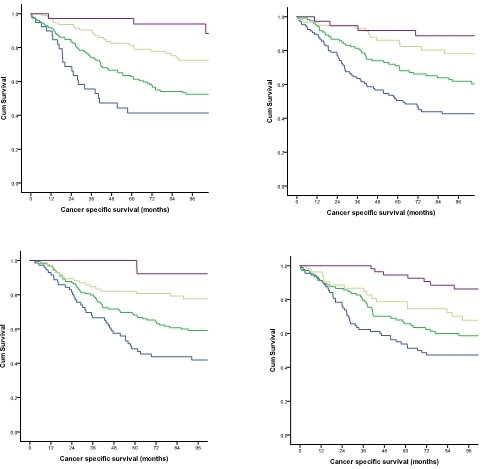|
Back to Annual Meeting Posters
The Clinical Utility of the Local Inflammatory Response in Colorectal Cancer
Colin H. Richards*1, Campbell S. Roxburgh1, Arfon G. Powell1, Alan K. Foulis2, Paul G. Horgan1, Donald C. Mcmillan1
1Department of Surgery, Glasgow University, Glasgow, United Kingdom; 2Department of Pathology, University of Glasgow, Glasgow, United Kingdom
Background
The host immune response is important in the prevention of tumour progression in solid organ cancers but is not utilised in clinical practice. The aim was to evaluate the clinical utility of the local inflammatory response in patients with colorectal cancer.
Methods
Three hundred and sixty-five patients with primary operable colorectal cancer were included. The local inflammatory response was assessed using three different methods; (1) individual immune cells (CD3+, CD8+, CD45R0+, FOXP3+); (2) a composite immunohistochemistry-based score (Galon Immune Score); (3) a histopathological assessment (Klintrup-Makinen grade). Relationships with tumour and host characteristics were established and the prognostic value of each method compared.
Results
A strong infiltration of tumour infiltrating lymphoctyes (TIL's) was associated with improved cancer specific survival. When specific T-cell subtypes were considered, CD3+ was the strongest predictor of survival at both the invasive margin (CD3+ IM) and tumour stroma (CD3+ ST) while CD8+ was the strongest predictor in the cancer cell nests (CD8+ CCN). Infiltration of TIL's was associated with early tumour stage, an expanding growth pattern and lower levels of venous invasion but was not influenced by host characteristics or systemic inflammation. The Galon Immune Score and the Klintrup-Makinen grade were strongly related to individual T-cell infiltration and all three methods exhibited similar survival relationships in both node-positive and node-negative disease.
Conclusion
A coordinated adaptive immune response is an important factor in predicting outcome in patients with colorectal cancer. By comparing different methodologies we have provided a foundation on which to develop a standardised approach for assessing tumour inflammatory cell infiltrate.

Figure 1. Kaplan-Meier survival curves demonstrating the cancer specific survival of patients with primary operable colorectal cancer according to the application of proposed immune scores. Clockwise from top left; CD+ IM, CD8+ CCN, K-M grade and the Galon Immune Score (strong to weak infiltration are shown top to bottom).
Back to Annual Meeting Posters
|


